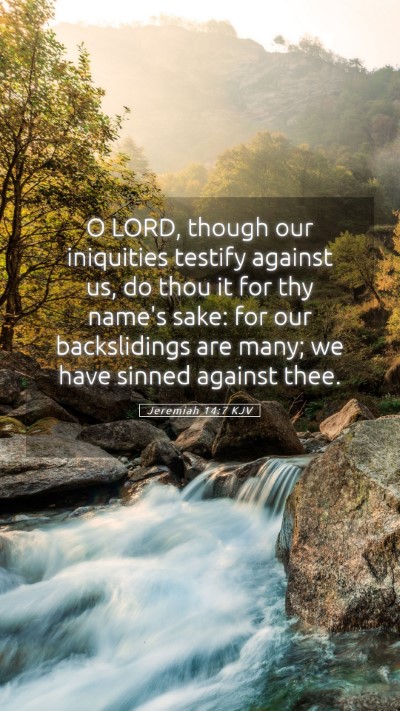Understanding Jeremiah 14:7
Jeremiah 14:7 reads, "Though our iniquities testify against us, O Lord, do it for Your name’s sake; for our backslidings are many, we have sinned against You." This verse encapsulates a plea for mercy from God amidst acknowledgment of sin. Here, the prophet Jeremiah is speaking on behalf of the people of Judah, who are suffering from drought and spiritual desolation. This verse expresses an understanding of God’s character as ready to forgive despite their transgressions.
Biblical Context and Historical Background
This verse comes from a profound period in Israel's history marked by impending judgment. Jeremiah, known as the weeping prophet, lamented over the unfaithfulness of his people. The context of this passage points to severe circumstances, including drought and famine, which serve as manifestations of God’s displeasure due to the sins of the people.
Bible Verse Meanings and Interpretations
The following insights derived from renowned public domain commentaries help illuminate the meaning and significance of this verse:
-
Matthew Henry: Matthew Henry emphasizes the gravity of sin and its consequences. He notes that the acknowledgment of iniquities is essential for repentance and a plea for divine intervention. The idea that we must appeal to God’s name and reputation suggests a recognition that God’s mercy transcends human sinfulness.
-
Albert Barnes: Barnes highlights the urgency in Jeremiah's plea. He interprets the cry as a recognition of guilt and a request for God's action not based on merit but on His own glory. This reflects a deep understanding of God's character—that He operates out of love and mercy, regardless of human failures.
-
Adam Clarke: Clarke discusses the notion of backsliding, pointing out that it signifies turning away from God and His commandments. Clarke's commentary sheds light on the importance of confession and repentance found in this verse, illustrating how genuine remorse can lead to restoration.
Insights on Sin and Repentance
Jeremiah 14:7 is a stark reminder of human sinfulness. The verse calls for introspection about the nature of sin and its effects on one’s relationship with God. It is an example of how recognizing and admitting sins can pave the way for sincere repentance. The repetition of their many backslidings indicates a pattern of disobedience, which serves as a collective acknowledgment from the people.
Application for Today’s Believers
The principles embedded in this verse remain relevant for modern readers. Believers today can learn to appeal to God's grace, recognizing their shortcomings while seeking to renew their relationship with Him. It reminds Christians of the necessity of repentance, not just individually but collectively as a community of faith.
Related Bible Cross References
- Psalm 51:1-2: This psalm is a heartfelt confession and appeal for mercy, echoing the sentiments of Jeremiah.
- Isaiah 59:1-2: Discusses how sin separates humanity from God, illustrating the need for reconciliation.
- 1 John 1:9: A New Testament affirmation that if we confess our sins, God is faithful to forgive.
Conclusion
In summary, Jeremiah 14:7 invites us to confront our iniquities and approach God with a humble heart, seeking His forgiveness based on His steadfast love and glory. This verse serves as a poignant reminder of the importance of accountability and the hope found in God’s merciful character. For anyone engaging in bible study groups or seeking bible study tools, this passage offers significant bible study insights necessary for understanding biblical repentance and mercy.


